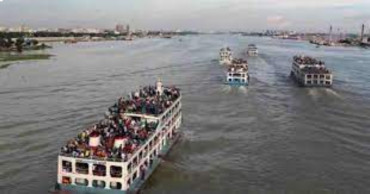shortage
Flood crisis grips Kurigram: thousands trapped, shortage of food-water intensifies
The Brahmaputra, Dharla, Teesta, and Dudhkumar rivers in Kurigram are witnessing a steady rise in water levels, leading to the trapping of approximately 12,000 families residing in low-lying areas across nine upazilas of the district.
As a result, the plight of the flood-affected people has intensified, with the families in the Char areas suffering the most.
Particularly in the Brahmaputra basin, they find themselves in dire distress as their homes remain submerged for five consecutive days. Many have been forced to abandon their houses and seek refuge on boats and elevated surfaces and face a scarcity of dry food and clean water.
Also Read: Onrush of upstream water, rain trigger flood in Kurigram
More than two hundred families, residing in ten chars including Purba Baladoba, Kalir Alga, Musarchar, and Sadar Char in the Brahmaputra river basin of Ulipur Upazila, have evacuated their homes and are currently living in inhospitable conditions aboard boats and elevated areas.
These families are unable to cook meals properly. Moreover, they are grappling with a lack of access to dry food and clean water due to the submersion of tube wells. Adding to their woes, the communication system has been disrupted, severing the rural road network in the river basin.
Additionally, approximately 100 hectares of land in the district have been inundated, resulting in submerged crops and posing difficulties for the flood-affected populace in providing fodder for their livestock.
Also Read: Incessant rains trigger fear of flood in Sylhet
Bangladesh Water Development Board’s Kurigram office said that water levels in all rivers of Kurigram remain below the danger level. As of noon, the Dudhkumar river's water level at the Pateshwari point is 4 cm below the danger level. Similarly, the Dharlar Setu point in Kurigram Sadar records a water level of 39 cm, Nunkhawa point on the Brahmaputra river at 55 cm, Chilmari point at 61 cm, and Kaunia point on the Teesta river at 89 cm, all below the danger level.
Expressing his concerns, Abdur Rahman from Baladoba Char said that 49 families reside in the char.
He said, "Most of the houses here are partially submerged in water. Many people are abandoning their homes and seeking shelter in elevated areas and boats. Due to the sinking of tube wells, clean water is scarce. Many individuals are compelled to survive on a single meal a day because cooking facilities are severely hampered."
Also Read: Short-term flood likely in Sylhet, Sunamganj as rivers keep swelling
2 years ago
Shortage of passengers, fuel price hike lead to decrease in vessels plying Dhaka-Barishal route
Launch owners have decreased the number of vessels plying the Dhaka-Barishal route due to shortage of passengers and price hike of fuel.
Three launches ply the Dhaka-Barishal-Dhaka route each day, the MV Manami’s Director Ahmed Jaki Anupam said after a meeting of launch owners of the Bangladesh Inland Waterways Association in the capital on Tuesday.
A total of 18 launches have been categorized into six groups to operate on the route per day, he said.
Director Anupam informed that the Barishal-bound launch from Dhaka will reach around 5am after departing around 8pm. On the other hand the Dhaka-bound launch from Barishal will also leave at 6am and arrive around 8pm on the same day.
Read: Upto 30 launch services from Sadarghat forced to fold post-Padma Bridge
He further said decision to stop overtaking among launches was taken at the meeting. All the decisions taken at the meeting will be implemented within four to five days.
Mahbub Uddin Ahmed Bir Bikram presided over the meeting where its Vice President Bodiuzzaman Badal, Managing Committee’s Convenor of Dhaka Rivers Ports Water Traffic Plying Mamun-Or-Rashid and launch owners were present.
3 years ago
ICU, HDU in Chuadanga sadar hospital suffer from shortage of manpower
Medicare services of ICU and HDU units at Chuadanga sadar hospital remain suspended for around nine months due to lack of manpower causing a grave concern in the district as the fourth wave of the Covid-19 has already started in the country.
Residents of the district have urged the concerned authorities to take necessary measures to open the life-saving units further taking into account the prevailing situation.
Sources said one ‘Sajeda Foundation’ inked a deal with the hospital authority on March 21 last year that they would treat ICU and HDU patients with their own manpower and necessary equipment including ventilator for a period of two months.
As per the deal, the foundation set up 6 ICU beds, 8 HDU beds, two ventilators and other equipment on the third floor of the hospital’s new building later.
A team of 44 members of the foundation including 10 physicians, 14 ICU staff nurses, 7 ward boys, one each lab technologist and X-ray technologist and others started treating patients especially for Covid-19 from July 26 last year.
Though local lawmaker and heroic freedom fighter Solaiman Haque Joarder formally inaugurated the units on August 07 last year, the foundation engaged itself in serving patients much earlier.
The hospital authority said providing the ICU and HDU services to patients with the equipment have been halt for shortage of manpower for last nine months as the foundation left the hospital with their manpower after end of the tenure of the deal.
Read: Baby snake killed after bit by 16 months old in Chuadanga
Aminu Islam and Abdul Kader, treatment seekers who came at the hospital told this correspondent that they were very happy to learn about launch of the ICU and HDU units at the hospital last year as there was no ICU bed at any government and private hospitals in the district.
Expressing grave concern over the closure of the two units after two months of launching, they have urged the prime minister to open the life-saving units soon permanently.
Dr Nafiz Ullah, who performed duty as residential physician at the ICU unit during the tenure, told the UNB that the foundation provided patients with the ICU and HDU services with its own manpower and instruments for the two months as per the deal during the Covid pandemic in Chuadanga.
After the expire of tenure of the contract, the foundation donated the instrument of the units to the hospital authority and all manpower left, he said adding that they in a survey found activities of the units remain suspended owing to shortage of manpower.
The equipment including the expensive ventilators will go out of order if these lay idly for long, he said.
Dr Ataur Rahman, Caretaker of Chuadanga sadar hospital, told this correspondent that he was not attached to the hospital when the foundation treated patients and donated the equipment.
He said the units remain closed due to shortage of skilled manpower and other factors.
We sent a letter to health ministry to take necessary measures to run the units further considering the current situation, Dr Ataur added.
3 years ago
Severe water shortages strain wheat harvest in Iraq
Salah Chelab crushed a husk of wheat plucked from his sprawling farmland south of Baghdad and inspected its seeds in the palm of one hand. They were several grams lighter than he hoped.
“It’s because of the water shortages,” he said, the farm machine roaring behind him, cutting and gathering his year’s wheat harvest.
Chelab had planted most of his 10 acres (4 hectares) of land, but he was only able to irrigate a quarter of it after the Agriculture Ministry introduced strict water quotas during the growing season, he said. The produce he was growing on the rest of it, he fears, “will die without water.”
At a time when worldwide prices for wheat have soared due to Russia’s invasion of Ukraine, Iraqi farmers say they are paying the price for a government decision to cut irrigation for agricultural areas by 50%.
The government took the step in the face of severe water shortages arising from high temperatures and drought — believed to be fueled by climate change — and ongoing water extraction by neighboring countries from the Tigris and Euphrates rivers. All those factors have heavily strained wheat production.
Wrestling with the water shortage, Iraq’s government has been unable to tackle other long-neglected issues.
Desertification has been blamed as a factor behind this year’s relentless spate of sandstorms. At least 10 have hit the country in the past few months, covering cities with a thick blanket of orange dust, grounding flights and sending thousands to hospitals.
“We need water to solve the problem of desertification, but we also need water to secure our food supplies,” said Essa Fayadh, a senior official at the Environment Ministry. “We don’t have enough for both.”
Iraq relies on the Tigris and Euphrates rivers for nearly all of its water needs. Both flow into Iraq from Turkey and Iran. Those countries have constructed dams that have either blocked or diverted water, creating major shortages in Iraq.
Water Resources Minister Mahdi Rasheed told The Associated Press that river levels were down 60% compared to last year.
For Chelab, less water has meant a smaller grain size and lower crop yields.
In 2021, Chelab produced 30,000 tons of wheat, the year before that 32,000, receipts from Trade Ministry silos show. This year, he expects no more than 10,000.
READ: India's Chennai rapid growth threatened by water shortages
His crops are both rain-fed and irrigated via a channel from the Euphrates. Due to low precipitation levels, he has had to rely on the river water during the growing season, he said.
Government officials say change is necessary.
The current system has been inefficient and unsustainable for decades. Water scarcity is leaving them no choice but to push to modernize antiquated and wasteful farming techniques.
“We have a strategic plan to face drought considering the lack of rain, global warming, and the lack of irrigation coming from neighboring countries as we did not get our share of water entitlements,” said Hamid al-Naif, spokesman at the Agriculture Ministry.
The ministry took measures to devise new types of drought-resistant wheat and introduce methods to increase crop yields.
“We are still dealing with irrigation systems of the 1950s. It has nothing to do with the farmers,” he said. “The state must make it efficient, we must force the farmer to accept it.”
Iraqi farmers have historically been heavily dependent on the state in the production of food, a reliance that policymakers and experts said drains government funds.
The Agriculture Ministry supports farmers by providing everything from harvesting tools, seeds, fertilizers and pesticides at a subsidized rate or for free. Water diverted from rivers for irrigation is given at no cost. The Trade Ministry then stores or buys produce from farmers and distributes it to markets.
Wheat is a key strategic crop, accounting for 70% of total cereal production in the country.
Planting starts in October and harvest typically begins in April and extends to June in some areas. Last year, the Agriculture Ministry slashed subsidies for fertilizers, seeds and pesticides, a move that has angered farmers.
Local demand for the staple is between 5-6 million tons a year. But local production is shrinking with each passing year. In 2021, Iraq produced 4.2 million tons of wheat, according to the Agriculture Ministry. In 2020, it was 6.2 million tons.
“Today we might get 2.5 million tons at best,” said al-Naif. That would require Iraq to drive up imports.
Most of the wheat harvest is usually sold to the Trade Ministry. In a sign of the low harvest, so far there are currently only 373,000 tons of wheat available in Trade Ministry storehouses, al-Naif said.
To meet demands amid the recent global crisis in the grain market, the government recently changed a policy to allow all Iraqi farmers to sell their produce to the Trade Ministry silos. Previously, this was limited to farmers who operated within the government plan.
Back in Chelab’s farm, the wheat is ready to be transported to the silo.
“It’s true we need to develop ourselves,” he said. “But the change should be gradual, not immediate.”
3 years ago
BNP blames govt’s inaction for soybean oil shortage
BNP on Monday alleged the country is facing an ‘artificial’ shortage of soybean oil for lack of market intervention and the government’s lack of accountability.
“Had there been a government accountable to people, it would have intervened in the market and arrested the syndicates involved in market manipulation. But that is not happening, resulting in the soybean oil crisis,” said BNP Senior Joint Secretary General Ruhul Kabir Rizvi.
He came up with the remarks while talking to reporters at the graveyard of BNP founder and late President Ziaur Rahman in Sher-e-Bangla Nagar in the city.
Rizvi along with leaders and activists of Jatiyatabadi Sramik Dal paid homage to Zia by placing a wreath at his grave, marking the 43rd founding anniversary of BNP’s labour wing.
READ: Govt let loose police against BNP, alleges Rizvi
The BNP leader said the common and low-income people are struggling to cope with the unbridled price hike in daily essentials, including soybean oil, rice, pulses and flour.
“One of the reasons for this is severe inflation caused by siphoning off money abroad in the name of development. Due to this horrible inflation, the income of the low-income people and the workers has not increased at all,” he observed.
Rizvi said many people are going to celebrate the Eid-ul-Fitr with great difficulty as they are already hit hard by the soaring prices of essential commodities.
Rizvi said their party has been carrying out various programmes in protest against the growing price hike in essential items.
He alleged that many homebound passengers, mainly workers, went through sufferings on their way to homes in different districts from the capital on the occasion of Eid.
3 years ago
Covid-19: What life is like when hospitals refuse admission!
Even if you have the money, there is no guarantee that you will be able to get admitted to a hospital for Covid-19 treatment right away as hospitals are overwhelmed and extremely unequipped, says Rafiqul Islam, a resident of Dakkhin Surma upazila of Sylhet.
“My father tested positive five days back and is struggling for breath. He needs an ICU bed but all beds are occupied everywhere. We had been to Osmani Medical College Hospital and then to two private hospitals but there was no ICU bed to get him admitted," Rafiqul, a working man in his late 40s, told the UNB correspondent in front of North East Medical College Hospital.
“Even the wait at every hospital and every desk was frustrating. We were frequently advised to have patience as they were having a very difficult time. Our medical system has collapsed!” says Rafique.
There is nothing unique in Rafiqul Islam’s case. It is now a common scenario in Sylhet as the number of cases has skyrocketed here in recent weeks as elsewhere in the country.
Relatives of Covid-infected patients are running from one hospital to another to have an ICU bed for them.
READ: Sylhet division reports highest single-day Covid cases of 802
Every day the relatives are having the names of patients listed with the hospitals here in an effort to get an ICU bed once it becomes available.
4 years ago
No oxygen shortage in frontier districts: DGHS
The frontier districts of Bangladesh have adequate oxygen in their stocks to deal with Covid-19 patients, DGHS spokesperson Dr Nazmul Islam said on Wednesday.
“Although the Covid positivity rate in frontier districts is much higher than the rest of the country, there’s no need to panic as hospitals have adequate medical supplies alongside oxygen in their stocks,” said the spokesperson of Directorate General of Health Services (DGHS).
He said about 1,569 high-flow nasal cannulas and 1,469 oxygen concentrators have been provided across the country. “We also have more than 23,000 oxygen cylinders.”
READ: Focus on black fungus as it adds to woes, says DGHS
Nazmul Islam, however, said, “Everyone should follow health guidelines as Covid infection rate is on the rise again.”
According to the initial plan, he said, Pfizer vaccine will be given only in the capital. This vaccine will be given on a priority basis to those who have got registered, he added.
If students are there in the list, they will also be given priority, he said adding, “The date on which the Pfizer vaccination programme will begin has not yet been fixed.”
Covid situation in Bangladesh
Bangladesh recorded 34 more coronavirus-related deaths and 1,988 new cases in 24 hours till Wednesday morning as the country continues to grapple with the pandemic situation.
READ: Covid positivity rate rises in Bangladesh, 34 more die
The daily infection rate increased to 9.81 percent from Tuesday’s 9.47 percent, while the mortality rate remained static at 1.58 percent.
Among the deceased, 11 died in Dhaka division while five each in Khulna, Chattogram and Rajshahi divisions, 3 each in Sylhet and Rangpur and one in Barishal divisions.
Lockdown in districts
District administrations have been given the authority to enforce lockdowns in their areas if the Covid-19 situation deteriorates there, the cabinet secretary said on Monday.
READ: DGHS urges holidaymakers to return to Dhaka after 14 days
The government has already given such an instruction to local administrations, said Cabinet Secretary Khandker Anwarul Islam at a press briefing after a virtual Cabinet meeting held with Prime Minister Sheikh Hasina in the chair.
4 years ago




.png)
.jpg)
.jpg)


